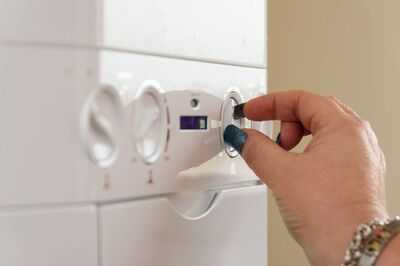We're approaching that time of year when boilers get more use - after all, temperatures have begun to drop, meaning we've all felt the chill a bit more lately. With the weather turning colder, we'll all probably be relying on our boilers more frequently, as people will be drawn to switch on the heating to keep warm indoors.
With this in mind, Brits have been urged to carry out a straightforward boiler inspection now to avoid the danger of receiving a substantial energy bill during the winter period. It takes virtually no time at all to complete, but could have a significant impact on your household budget.
To assist people, a top engineer has disclosed the heating blunders costing families hundreds - and occasionally thousands - of pounds annually. He's offered professional guidance in the hope it will help people cut costs and discover much more about their boilers.
- Five trendiest ways to wear check print with buys from the high street
- Rylan Clark issued warning by co-star as she shares true thoughts on his new partner
Patrick Garner, Gas Safe Engineer at Heatable, explains that far too many people overlook vital inspections that not only reduce bills, but also prevent hazardous malfunctions. He stated: "One of the biggest mistakes we see is people skipping their annual boiler service.
"Not only does that put your household at risk of dangerous faults going unnoticed, but it can also invalidate the manufacturer's warranty - leaving you with the full bill if something goes wrong."

With annual servicing typically costing less than £100, avoiding it represents a false economy. Garner cautioned: "You're essentially risking a complete boiler replacement - £2,000 to £3,000 - for the sake of the price of a service.
"On top of that, an inefficient boiler can add 10% or more to your gas bill over time." Another expensive mistake is neglecting water quality within heating systems.
Without adequate flushing and a magnetic filter, sludge and debris accumulate. This compels the boiler to work harder, consuming more energy and dramatically shortening its lifespan.
Just as dangerous is enclosing a boiler in a cupboard without proper ventilation or completely obstructing air vents.
Garner noted: "Boilers and heating systems are designed to breathe and flow. Cutting off airflow doesn’t just make them inefficient – it increases the risk of dangerous carbon monoxide build-up."
Even shutting your system down for months on end can prove counterproductive. Pumps, valves and seals may seize up, leading to substantial repair costs when heating is eventually switched back on.
So, what warning signs should homeowners watch for? Strange sounds such as banging or gurgling typically indicate air or sludge has entered the system.
Dark staining around the boiler casing could signal incomplete combustion - a serious carbon monoxide warning sign.
Should you ever detect gas, it's an emergency, and you must turn off immediately and contact the Gas Emergency Service. Fortunately, a handful of budget-friendly inspections can slash costs and prevent unwelcome shocks.
Garner suggests reducing your boiler's flow temperature to approximately 60°C, bleeding radiators consistently to guarantee heat circulates properly and checking carbon monoxide detectors. He also recommends installing a magnetic filter, which should be cleaned at every service, describing it as "one of the cheapest ways to prevent expensive breakdowns."
This guidance should help you maximise your boiler's performance during the winter months. Nevertheless, if you have any worries, seek professional advice. Gas must always be treated with caution.
You may also like

$100K for an H-1B Visa to work in the US? Why the UAE now makes more sense than ever

IMD issues yellow alert for six Gujarat districts on Navratri

NATO jets scramble AGAIN after Russia spy plane enters Germany airspace as WW3 fears escalate

The beautiful European capital city where locals are embracing major car ban

India Again Refuse Handshake With Pakistan In Asia Cup Super Fours Game






